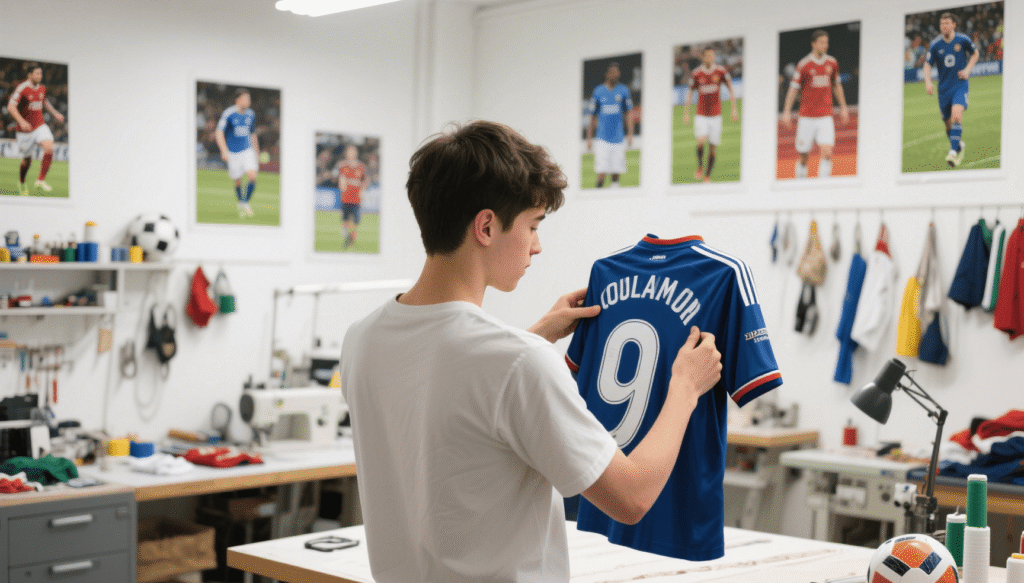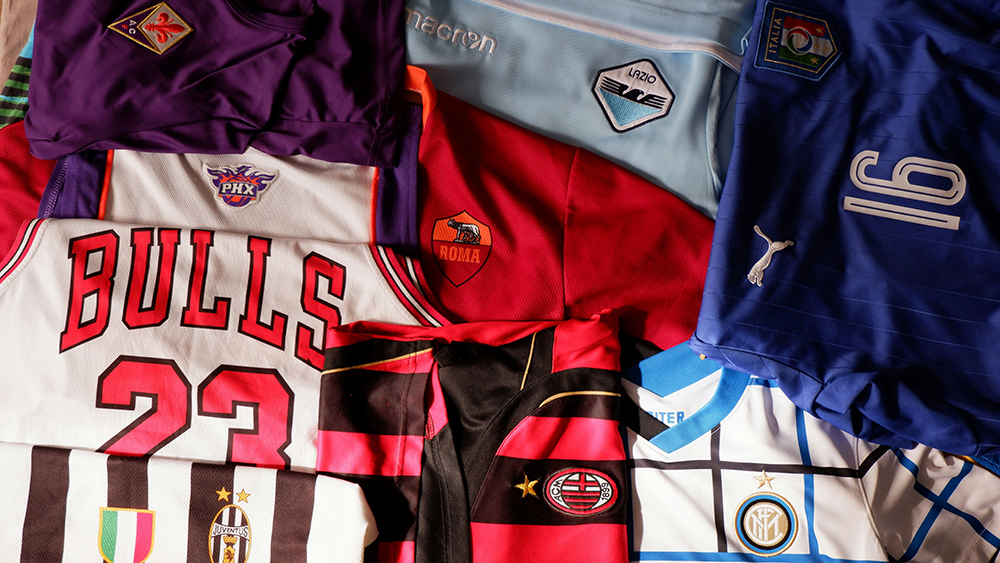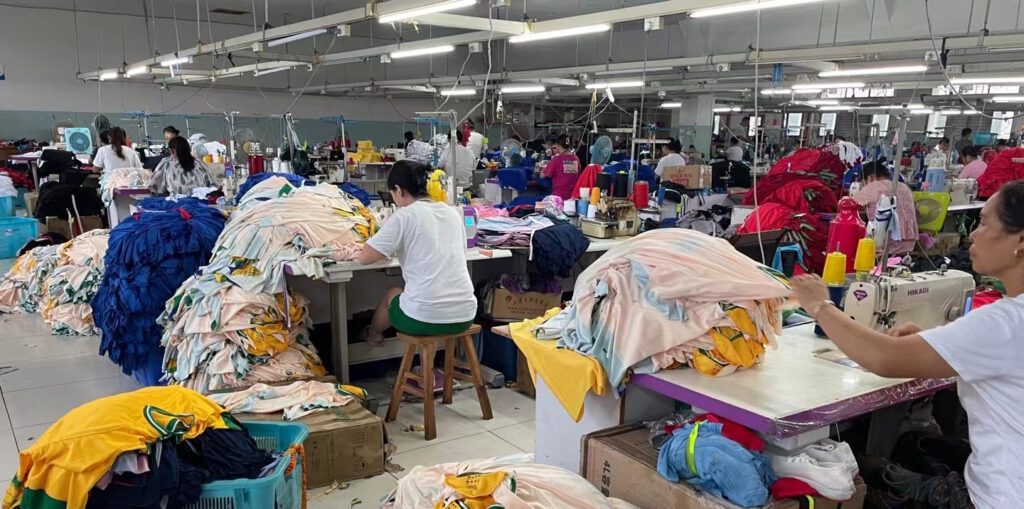SPORTSWEAR
How to Get a Reliable Supplier of Custom Soccer Jerseys?
Table of Contents
1. Where Can I Find Potential Custom Soccer Jersey Suppliers?
2. What Key Qualities Define a ‘Reliable’ Custom Soccer Jersey Supplier?
3. How Can I Verify a Supplier’s Experience and Specialization in Custom Soccer Jerseys?
4. What Red Flags Should I Watch Out for That Might Indicate an Unreliable Supplier?
5. What Should I Know About Their Production Capacity and Lead Times for Custom Orders?
6. What Happens if There’s a Problem With My Order? How Do Reliable Suppliers Handle Disputes or Issues?
7. Conclusion
Introduction
Are you trying to find a trustworthy supplier for custom soccer jerseys but feeling overwhelmed by all the options? Or maybe you’ve had a bad experience in the past with poor quality or missed deadlines.
Finding a reliable supplier is crucial, especially in the B2B world where consistency and quality directly impact your business. My name is Nancy, and I’m a manufacturer of sportswear in China. I’ve worked with many buyers like Marco from Italy, who need high-quality, customizable soccer gear and dependable service.
This article will guide you through the process of finding and vetting a reliable supplier. I’ll share practical tips based on my years of experience in this industry, helping you make informed decisions and avoid common pitfalls.
1. Where Can I Find Potential Custom Soccer Jersey Suppliers?
Struggling to even know where to begin your search for a good custom soccer jersey supplier? It can feel like looking for a needle in a haystack.
You can find potential custom soccer jersey suppliers through online B2B platforms like Alibaba, industry trade shows, targeted Google searches, and by asking for referrals within your professional network. Each source offers different advantages for discovering manufacturers and wholesalers.
These avenues can lead you to a variety of options, from large factories to specialized workshops.
Knowing where to look is the first step in connecting with the right manufacturing partner. In my experience, buyers successfully find suppliers like my company, Sihola Sports, through several key channels. It’s good to explore a few of these to get a broad view of what’s available.
1.1 Online B2B Platforms
These are huge marketplaces connecting buyers and sellers globally.
- Examples: Alibaba, Made-in-China.com, Global Sources. My company is also on platforms like ASI for the promotional products market in North America.
- Pros: Wide selection of suppliers, ability to filter by product, location, and certifications. You can often see company profiles, product catalogs, and sometimes even reviews.
- Cons: Can be overwhelming, quality varies greatly, requires careful vetting. Sometimes communication can be a challenge if language barriers exist.
- My Tip: Look for suppliers with a good number of years on the platform, positive reviews, and verification badges. Don’t just rely on the listed information; always ask more questions.
1.2 Industry Trade Shows
These are events where manufacturers and suppliers showcase their products.
- Examples: ISPO (for sporting goods), Canton Fair (general import/export fair in China), various apparel sourcing shows globally.
- Pros: You can meet suppliers face-to-face, see and touch product samples directly, and discuss your needs in detail. It’s a great way to build initial trust.
- Cons: Can be expensive to attend (travel, accommodation). The range of suppliers might be limited to those who exhibit.
- My Tip: Prepare well before attending. Know what you’re looking for and make a list of exhibitors to visit. I’ve met many long-term clients at these shows.
1.3 Search Engines (Google, Bing)
A simple online search can yield many results.
- How to Search: Use specific keywords like "custom soccer jersey manufacturer China," "wholesale sublimated jerseys USA," or "private label sportswear supplier."
- Pros: Access to a vast number of suppliers, including those who might not be on B2B platforms or attend all trade shows. You can often find their direct websites.
- Cons: Requires effort to sift through results and identify legitimate, capable suppliers. The top results aren’t always the best suppliers.
- My Tip: Look beyond the first page of results. Check company websites carefully for professionalism, product information, and contact details.
1.4 Referrals and Professional Networks
Sometimes the best leads come from people you already know.
- Sources: Colleagues in the industry, business contacts, forums, LinkedIn groups.
- Pros: Recommendations often come with a level of trust. You can get honest feedback about a supplier’s reliability.
- Cons: Your network might not have contacts for your specific product niche.
- My Tip: Don’t be afraid to ask around. Many buyers I work with, especially those experienced like Marco, have found good partners through word-of-mouth.
Exploring these different avenues will give you a good list of potential suppliers to start with. The next step is to figure out which ones are truly reliable.
2. What Key Qualities Define a ‘Reliable’ Custom Soccer Jersey Supplier?
Worried about choosing a supplier who seems great at first but then fails to deliver on quality or promises? This uncertainty can be very stressful for buyers.
A reliable custom soccer jersey supplier consistently delivers quality products on time, communicates clearly and honestly, offers fair pricing, and works collaboratively to solve any issues that arise. They are transparent in their processes and value long-term partnerships.
These qualities are the foundation of a good business relationship and ensure you get the products you need.
Once you have a list of potential suppliers, how do you know which ones are truly "reliable"? It’s not just about price. As a manufacturer who aims to be a reliable partner for my clients, I believe certain qualities are essential. These are the things that buyers like Marco from Italy, who is very quality-conscious, always look for.
Here are the key qualities I believe define a reliable supplier:
2.1 Consistent Product Quality
This is non-negotiable.
- What it means: The jerseys you receive match the approved samples every time. The materials, stitching, printing (especially for sublimation), and sizing are consistent across all orders.
- Why it’s important: Your customers expect a certain standard. Inconsistent quality can damage your brand’s reputation. I always emphasize strict quality control in my factory.
2.2 Clear and Timely Communication
Good communication prevents misunderstandings and delays.
- What it means: The supplier responds to your inquiries promptly. They provide clear answers to your questions and keep you updated on your order status. They are proficient in your business language (usually English).
- Why it’s important: When you’re thousands of miles away, clear communication builds trust and helps manage expectations. My sales team knows that quick and clear replies are crucial.
2.3 Transparency
An honest supplier is open about their processes.
- What it means: They are willing to explain their production methods, their quality control steps, and how they source materials. They are upfront about their capabilities and limitations.
- Why it’s important: Transparency helps you understand what you’re paying for and builds confidence in their ability to deliver.
2.4 Fair Pricing and Payment Terms
Price is important, but it should be fair and reflect the quality and service.
- What it means: The supplier provides detailed quotes with no hidden costs. Their pricing is competitive for the quality offered. They offer reasonable payment terms (e.g., a deposit upfront and balance upon completion/shipment, rather than demanding full payment before production starts).
- Why it’s important: You need to manage your budget, but extremely low prices can be a red flag for poor quality or unethical practices.
2.5 Adherence to Timelines
Delivering on time is critical, especially for seasonal products or events.
- What it means: The supplier provides realistic lead times for samples and production, and they stick to them. If unforeseen delays occur, they inform you promptly and explain the situation.
- Why it’s important: Missed deadlines can mean lost sales opportunities for you. My client Marco often emphasizes how crucial on-time delivery is for his seasonal soccer product launches.
2.6 Problem-Solving Attitude
Issues can sometimes arise. A reliable supplier works with you to resolve them.
- What it means: If there’s a problem with an order (e.g., a quality issue, a shipping delay), they take responsibility and work actively to find a fair solution, rather than making excuses or blaming others.
- Why it’s important: How a supplier handles problems tells you a lot about their commitment to customer satisfaction and long-term relationships.
Finding a supplier who embodies these qualities takes effort, but it’s worth it for a smooth and successful partnership. These are the standards we strive for at Sihola Sports.
3. How Can I Verify a Supplier’s Experience and Specialization in Custom Soccer Jerseys?
Concerned that a supplier might claim expertise in custom soccer jerseys but lack real experience? This could lead to poor quality products unsuited for your market.
Verify a supplier’s experience by requesting a portfolio of their custom soccer jersey work, ordering samples to assess quality firsthand, inquiring about their customization capabilities (like sublimation techniques and fabric options), and checking for relevant certifications or client testimonials.
Taking these steps helps ensure they can meet your specific requirements.
It’s one thing for a supplier to say they specialize in custom soccer jerseys, but how can you be sure they really have the experience and skills? As a buyer, you need to do some digging. This is especially true if you’re looking for specific features, like high-quality sublimation printing, which is a specialty of my company.
Here are practical ways to verify a supplier’s expertise:
3.1 Ask for Their Portfolio and Case Studies
Seeing is believing.
- What to look for: Examples of custom soccer jerseys they have produced for other clients. Pay attention to the complexity of designs, the quality of printing (especially if you need sublimation), and the types of clients they’ve worked with (e.g., sports teams, apparel brands, promotional companies).
- My advice: Don’t just look at pretty pictures. Ask about the specifics of those projects – what were the challenges? How did they ensure quality?
3.2 Request Samples
This is one of the most important steps.
- Types of samples:
- Factory samples: Existing examples of their work to show general quality.
- Custom samples: A sample made to your exact design specifications. This will likely have a cost but is invaluable.
- What to check: Fabric quality, stitching durability, print vibrancy and feel (is it rough or smooth? does it crack?), accuracy of colors, fit, and overall construction. For sublimated jerseys, check if the print is sharp and if there’s any "ghosting" or color bleeding.
- My practice: We always encourage clients to order samples. It’s the best way for them to see our quality firsthand before committing to a large order.
3.3 Inquire About Their Customization Capabilities
A true specialist will offer a range of options.
- Key questions:
- What types of fabrics do they offer for soccer jerseys (polyester, moisture-wicking, specific weights)?
- What printing methods do they specialize in (sublimation, screen printing, embroidery for badges)? If sublimation, ask about their printers, inks, and color matching process.
- Can they handle complex designs, specific Pantone colors, different types of collars, and various sizing requirements (e.g., youth, adult, men’s, women’s cuts)?
- Do they offer add-ons like custom neck labels, hang tags, or individual player names and numbers?
- My insight: A supplier who genuinely specializes will be able to discuss these details confidently and offer knowledgeable advice.
3.4 Check for Certifications and Audits (If Applicable)
Relevant certifications can indicate a commitment to quality and ethical practices.
- Examples: ISO 9001 (quality management), WRAP (ethical production), OEKO-TEX (textile safety).
- Verification: Ask for copies of certificates and check their validity. Be aware that not all good small or medium factories will have extensive certifications, but it’s a good sign if they do. Some buyers, especially larger companies, require these.
3.5 Read Online Reviews, Testimonials, or Ask for References
What are other buyers saying?
- Sources: B2B platform reviews, Google reviews, testimonials on their website (though these are often curated). You can also ask the supplier if they can provide references from current clients, ideally in a non-competing business to yours.
- My note: While online reviews can be helpful, take them with a grain of salt. Direct references, if you can get them, are often more insightful.
By taking these steps, you can build a much clearer picture of a supplier’s real experience and whether they are a good fit for your custom soccer jersey needs. It’s about gathering evidence to support their claims.
4. What Red Flags Should I Watch Out for That Might Indicate an Unreliable Supplier?
Afraid of getting stuck with a supplier who promises the world but delivers headaches? Recognizing warning signs early can save you a lot of trouble and money.
Red flags for unreliable suppliers include consistently vague or slow communication, unrealistically low prices compared to the market, pressure for full upfront payment, refusal or inability to provide quality samples, a poor or non-existent online presence, and providing inconsistent information.
Spotting these signs can help you avoid suppliers who might not meet your standards.
While you’re looking for positive signs, it’s just as important to watch out for red flags. These are warning signals that a supplier might not be reliable or capable. I’ve heard stories from buyers who ignored early warnings and regretted it later. Here are some common red flags to be aware of:
4.1 Vague, Evasive, or Very Slow Communication
If they can’t communicate clearly before you place an order, it won’t get better.
- Examples: Taking days to answer simple questions, giving unclear or incomplete answers, avoiding direct questions about their factory or processes, frequent language misunderstandings that don’t improve.
- My perspective: As a supplier, we know prompt and clear communication is key. If a potential partner is already difficult to communicate with, imagine how it will be when there’s an actual order (and maybe a problem) to discuss.
4.2 Unrealistically Low Prices
If a price seems too good to be true, it probably is.
- What it might mean: They might be cutting corners on material quality, using unethical labor practices, or they might hit you with hidden charges later.
- My advice: Get quotes from several suppliers to understand the general price range for your requirements. Extremely low prices are a big warning. Quality materials and ethical production have a cost.
4.3 Pressure for Large Upfront Payments (Especially 100%)
Be wary of suppliers who demand full payment before they even start production.
- Common practice: A deposit (e.g., 30-50%) is normal to cover material costs, with the balance due before shipment or upon proof of shipment.
- Red flag: Demanding 100% upfront, especially for new customers, reduces their incentive to deliver on quality and time. It also puts all the risk on you.
4.4 No Samples, Poor Quality Samples, or Charging Excessive Fees for Samples
Samples are your best way to judge quality.
- Warning signs: Refusal to provide samples, sending samples that are very different from what you asked for, samples of obviously poor quality (bad stitching, sloppy printing, cheap fabric), or charging an unreasonably high price for a basic sample.
- My practice: We charge for custom samples because they take time and resources, but the fee is reasonable and often deductible from a bulk order. Refusing samples is a major red flag.
4.5 Lack of Verifiable Information or Poor Online Presence
A legitimate business should have a professional presence.
- Things to look for: No proper website or a very unprofessional one, no verifiable address or contact information, inability to provide business registration details, very few or very bad online reviews (if any).
- My tip: Do a quick search for the company name. If you find very little, or mostly negative information, be cautious.
4.6 Inconsistent Information or Over-Promising
If their story keeps changing or they promise things that seem impossible.
- Examples: Quoting different prices for the same item at different times, promising extremely fast lead times that no one else can meet, claiming to have certifications they can’t produce.
- My view: Honesty and consistency are key. A supplier who over-promises is likely to under-deliver.
Trust your gut. If something feels off, it often is. It’s better to spend more time vetting upfront than to deal with major problems down the line.
5. What Should I Know About Their Production Capacity and Lead Times for Custom Orders?
Worried if a supplier can actually handle your order size or meet your crucial deadlines? Misjudging this can lead to missed selling seasons or event dates.
You need to understand a supplier’s Minimum Order Quantities (MOQs), average lead times for both sampling and bulk production, how they manage peak seasons, and their scalability for larger orders. Reliable suppliers will be transparent about these factors and communicate proactively about any potential delays. Asking detailed questions helps you plan effectively.
Key Questions for Suppliers on Capacity & Lead Times
To properly assess if a supplier can meet your needs, ask these questions:
| Inquiry Topic | Specific Questions to Ask | Why It’s Important |
| MOQ | What is your Minimum Order Quantity per design/color? Is it negotiable? | Ensures your order size fits their production model. |
| Sample Lead Time | How long does it take to produce a custom sample once the design is finalized? | Helps you plan your product development timeline. |
| Production Lead Time| What is your average lead time for a bulk order of [your typical quantity] after sample approval? | Crucial for inventory planning and meeting market deadlines. |
| Peak Seasons | How do lead times change during peak seasons (e.g., pre-Christmas, major sports events)? | Helps you anticipate and plan for longer production times during busy periods. |
| Production Capacity | How many units can you produce per week/month? Can you share info about your factory size/staff? | Indicates their ability to handle your current and potentially future order volumes. |
| Scalability | If my orders grow significantly, can you scale production to meet increased demand? | Important for long-term planning if you anticipate business growth. |
| Delay Communication | How do you communicate if there are unforeseen production delays? | Shows their commitment to transparency and proactive problem-solving. |
Understanding these aspects is vital. For instance, my client Marco always needs his soccer jerseys before the European football season starts. If a supplier isn’t clear about their lead times, especially during busy periods, he could miss his key selling window. Clear communication from the supplier about their capacity helps us plan together effectively.
Once you’ve found a few promising suppliers and checked their initial credibility, it’s time to dig into the practical details of production. Can they actually make what you need, in the quantity you need, and by the time you need it? This is where understanding their production capacity and lead times becomes very important. As a manufacturer, these are questions I discuss upfront with all my new clients.
Here’s what you should find out:
5.1 Minimum Order Quantities (MOQs)
Most manufacturers will have an MOQ, which is the smallest order they are willing to accept.
- Why they have MOQs: Setting up machines, sourcing specific materials, and dedicating production lines for very small orders can be inefficient and costly.
- What to ask: "What is your MOQ per design/color for custom soccer jerseys?" "Are MOQs negotiable, perhaps for a slightly higher unit price or for first-time orders?"
- My insight: MOQs can vary greatly between factories. Smaller workshops might offer lower MOQs, while larger factories might require bigger commitments. We try to be flexible where possible, especially for new clients building their business.
5.2 Average Lead Times (Sampling and Production)
Lead time is the total time it takes from order confirmation to shipment.
- Sampling Lead Time: How long does it take to produce a custom sample once the design is finalized and any sample fee is paid? (Typically 7-14 days, but can vary).
- Production Lead Time: After you approve the sample and place the bulk order, how long will it take to manufacture and prepare your jerseys for shipping? (This depends heavily on order quantity, complexity, and current factory load. It could be anywhere from 3 to 8 weeks, or more).
- My advice: Always get these estimates in writing. Remember that shipping time is additional to production lead time.
5.3 Peak Season Considerations
Demand for certain products can be seasonal.
- Impact on lead times: During busy periods (e.g., before major sports tournaments, back-to-school season, or pre-holiday periods), factories can get very busy, and lead times can extend significantly.
- What to ask: "How do your lead times change during your peak production seasons?" "When are your peak seasons?"
- My experience: We always advise clients like Marco, who orders soccer gear tied to European football seasons, to place their orders well in advance of their required delivery date to avoid peak season rush.
5.4 Scalability for Larger Orders
If your business grows, can the supplier grow with you?
- What to ask: "What is your current maximum production capacity per month for this type of jersey?" "If my order quantities increase significantly in the future, do you have the ability to scale up production?"
- Why it matters: You want a long-term partner. If they can’t handle your growth, you’ll have to find a new supplier later, which can be disruptive.
5.5 Communication About Delays
Even with the best planning, delays can sometimes happen (e.g., material shortages, unexpected equipment issues).
- What to expect from a reliable supplier: They should inform you as soon as possible about any potential delays, explain the reason, and provide a revised timeline.
- My commitment: We believe in proactive communication. If there’s an issue, we let our clients know immediately.
Getting clear answers to these questions will help you plan your inventory, meet your market demands, and build a more predictable supply chain. It’s about aligning their capabilities with your business needs.
6. What Happens if There’s a Problem With My Order? How Do Reliable Suppliers Handle Disputes or Issues?
Dreading the thought of receiving a faulty order and then facing a supplier who won’t take responsibility? This is a major concern for any buyer.
Reliable suppliers handle order problems by having clear return or rework policies, investigating issues thoroughly, taking responsibility for their mistakes, and offering fair solutions like replacements, repairs, or discounts. Their goal is to resolve the issue and maintain a good relationship.
A supplier’s approach to problem resolution speaks volumes about their integrity.
No matter how good a supplier is, problems can sometimes occur. Maybe there’s a slight color variation, a misunderstanding in sizing, or a few defective items in a large batch. What’s important is how the supplier deals with these issues. This is often what separates a truly reliable partner from an unreliable one. From my experience, clients appreciate honesty and a willingness to make things right.
Here’s how reliable suppliers typically handle disputes or problems:
6.1 They Have Clear Policies in Place
Before you even place an order, a good supplier should be able to explain their policies regarding defects, returns, or remakes.
- What to look for: Ask about their Quality Assurance (QA) process and what happens if you receive items that don’t meet the approved sample standards.
- My practice: We have clear terms outlining how we handle quality issues, which we discuss with clients. It’s better to have this understanding upfront.
6.2 They Listen and Investigate Thoroughly
When you report a problem, a reliable supplier will take your concerns seriously.
- What they should do: Ask for details, photos, or even samples of the problematic items to understand the issue fully. They won’t just dismiss your complaint.
- My approach: If a client reports an issue, our first step is to gather all the information so we can accurately assess what went wrong.
6.3 They Take Responsibility for Their Mistakes
If the problem is due to an error on their part (e.g., used the wrong fabric, printing error not on the approved sample), a good supplier will admit it.
- Avoids: Making excuses, blaming the buyer, or trying to shift responsibility.
- Importance: Acknowledging a mistake is the first step towards resolving it fairly.
6.4 They Offer Fair and Practical Solutions
Depending on the nature and severity of the problem, solutions can vary.
- Possible solutions:
- Rework/Repair: If items can be fixed, they might offer to do so.
- Replacement: For defective items, they may offer to remake and resend them.
- Discount: For minor issues that don’t critically affect usability, they might offer a partial refund or a discount on future orders.
- Return and Refund: In some cases, a return for a full refund on the affected items might be appropriate.
- The Goal: The solution should be fair to both parties and aim to rectify the problem effectively. I remember a time a small batch of jerseys for a client had a slight stitching issue on the collar; we offered to either replace them or provide a discount, and the client chose the discount as it was a minor cosmetic issue for them.
6.5 They Value the Long-Term Relationship
A reliable supplier sees a problem not just as a financial issue, but as a threat to the business relationship.
- Focus: They will be more focused on finding a satisfactory resolution to keep you as a client, rather than just minimizing their own short-term loss.
- My philosophy: We aim for long-term partnerships. Solving problems fairly is key to building that trust.
Before you commit to a supplier, it’s a good idea to ask them hypothetically how they handle order issues. Their response can give you insight into their approach. Look for a supplier who is solution-oriented and committed to customer satisfaction.
Conclusion
Finding a reliable supplier for your custom soccer jerseys is a critical step for your business success. It involves more than just comparing prices. It’s about finding a partner you can trust.
Key takeaways from what I’ve shared, based on my experience as a manufacturer:
- Know Where to Look: Utilize online platforms, trade shows, and networks.
- Identify Key Qualities: Prioritize consistent quality, clear communication, transparency, and fair practices.
- Verify Experience: Request samples, check portfolios, and ask detailed questions about their specialization.
- Watch for Red Flags: Be cautious of poor communication, unrealistically low prices, and lack of transparency.
- Understand Capacity: Clarify MOQs, lead times, and how they handle busy periods.
- Assess Problem Solving: A reliable supplier takes responsibility and works to resolve issues fairly.
Building a strong relationship with a dependable supplier like my company, Sihola Sports, can save you time, money, and a lot of headaches. It ensures you consistently receive high-quality custom soccer jerseys that meet your specifications and delight your customers.
If you’re looking for a reliable manufacturing partner for your sportswear needs, please feel free to reach out to us.We’d be happy to discuss how we can help you.









